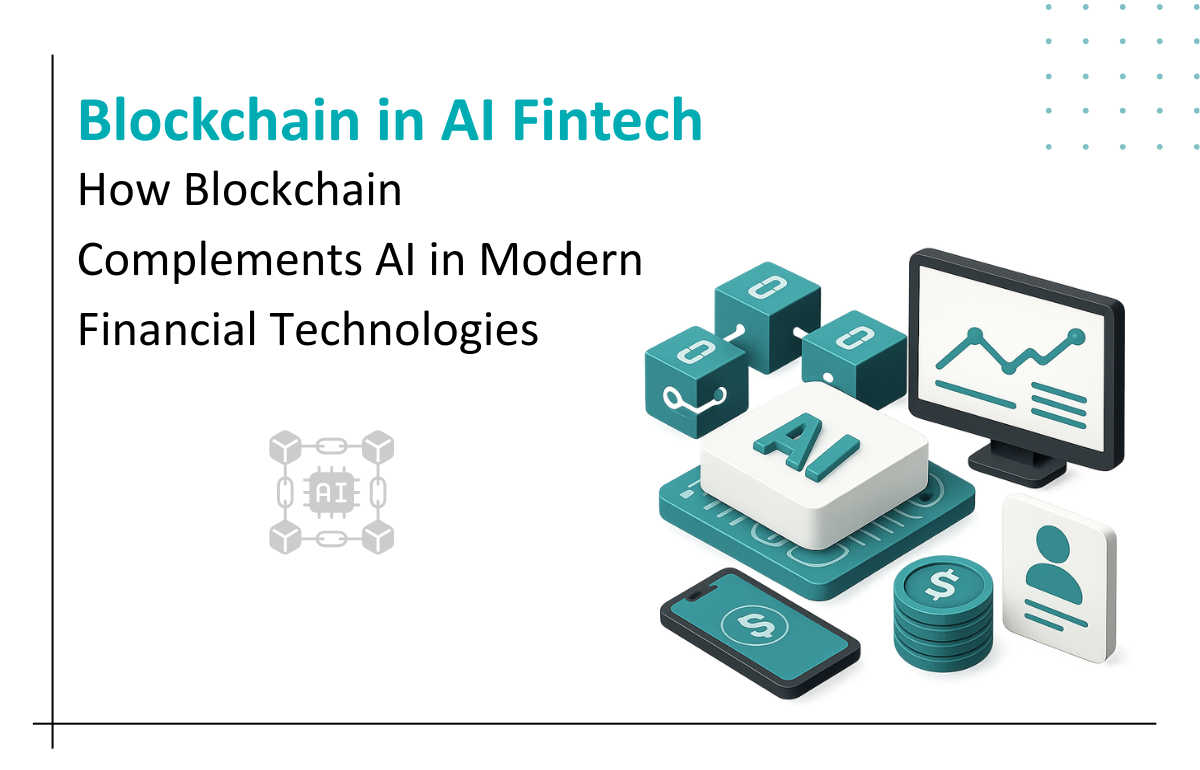
In a quickly changing fintech ecosystem, two great sources of disruption, Artificial Intelligence (AI) and Blockchain technology, and their combination, create endless opportunities for change. AI is changing how some financial institutions use data, and they can now predict trends and then automate the decision. At the same time, Blockchain will be developing a framework for decentralized information that is immutable with transparent, secure, and trustworthy.
As an isolated technology, they have their own unique value proposition, but together they are beginning to forge completely new capabilities in Financial Technology, including decentralized finance (DeFi), while tackling long-standing issues (a) data integrity and compliance, including blockchain compliance; (b) fraud avoidance; and (c) user trust. This convergence is a leading example of AI in fintech, driving smarter, more secure financial services.
AI thrives on large volumes of accurate data, and blockchain in fintech ensures data immutability and provenance. By merging these technologies, fintech platforms, especially those in decentralized finance, can offer smarter, faster, and more secure services.
Together, they enable:
Let’s explore this synergy in greater depth.
AI models are only as good as the data they are trained on. In fintech, data inconsistency and duplication, or manipulation may lead to not only poor decision-making but regulatory risks as well.
Example: A blockchain-backed credit scoring platform can use AI to analyze immutable transaction histories across banks to provide an accurate, real-time credit score without needing centralized databases.
One of the most exciting intersections is federated learning, where AI models are trained across multiple decentralized nodes without sharing raw data.
Example: Multiple insurance companies can collaborate to improve fraud detection AI models using federated learning on blockchain, without ever sharing their customers’ private claims data.
AI decisions, particularly in high-stakes domains like loan approval or fraud detection, are often criticized for their "black-box" nature. Regulators and users are demanding explainable AI (XAI) and (transparent) accountability.
Example: A fintech platform could record in a blockchain the feature inputs, risk score, and outcome for each AI lending decision, allowing auditors to verify specific borrowed model outputs would be fair and comply with regulations.
AI can detect patterns, make predictions, and take actions. Smart contracts allow those decisions to be executed automatically under predefined rules, enabling blockchain automation of complex financial workflows.
What you're creating is a fully-automated, closed-loop system. One that is intelligent, tamper-proof, and auditable.
Example: In decentralized finance (DeFi), AI in fintech applications such as AI credit scoring could be integrated to perform real-time collateralization or liquidation, built on Ethereum smart contracts.
Fraud detection is one of the major AI use cases in the fintech industry. AI will detect behavioral anomalies, while the blockchain supplies a real-time record of all transactions that can't be altered. The integration of AI fraud detection techniques further strengthens the ability to identify and prevent fraudulent activities proactively.
Example: Mastercard is using blockchain to store transaction logs and AI fraud detection to identify unusual behaviors across merchant accounts for real-time fraud alerts.
Customer onboarding in fintech faces issues like repetitive KYC processes, identity theft, and compliance costs.
Example: A user onboarded at one bank can seamlessly verify their identity at another using their blockchain wallet, with AI re-validating authenticity via biometric checks.
Tokenization is the process of transforming to-be-developed assets like stocks, real estate, or commodities into digital tokens on a blockchain. This process, often referred to as asset tokenization, enables the development of tokenized assets with expectations and all, then AI utilizes market signals, risk premiums, and user profiles to actively manage them like an expert trader. This is a core aspect of many decentralized finance platforms that aim to democratize access to asset management.
Example: A user invests in a tokenized ETF. AI tracks performance, reallocates based on risk appetite, and uses blockchain to validate and execute trades transparently.
Want to create your own digital assets? Learn more in our guide on creating a crypto token with custom blockchain development solutions to design and launch tokenized financial products securely and efficiently.
In fintech, data privacy and compliance concerns often restrict the sharing of valuable datasets across institutions.
Example: A decentralized data marketplace allows banks to contribute anonymized transaction data for AI model training, earning crypto rewards, all governed by blockchain.
| Company | Use Case |
| Fetch.ai | Decentralized AI agents for finance and trading on blockchain. |
| Ocean Protocol | Blockchain-based data sharing for AI with financial datasets. |
| Centrifuge | Tokenizes real-world financial assets for AI-powered DeFi lending. |
| Covalent | Unified API for blockchain data that feeds AI analytics. |
Despite their promise, integrating AI and blockchain in fintech faces hurdles:
We’re heading toward a future where AI + blockchain become the default infrastructure for fintech innovation. Think:
The shift is not just technological, it’s philosophical: from centralized control to decentralized intelligence.
Blockchain extracts transparency, security, decentralization, and auditability of artificial intelligence in fintech applications. If you're an investor or a fintech company, investing in the conjunction of technology is increasingly important for maintaining market share.
As innovation accelerates, we are poised to enter a new age of fintech that will be much more intelligent, while also being trustworthy and fair, driven by AI and secured by blockchain.
Seaflux Technologies is your trusted custom software development company for combining AI and blockchain technology to boost security and transparency. We deliver tailored custom AI solutions and blockchain development services designed for fintech companies.
As a top AI solution provider and fintech solutions provider, we build scalable, enterprise-grade applications, including custom blockchain development, real-time AI-driven DeFi platforms, automated compliance, and smart contracts.
We also provide managed blockchain services to ensure smooth operations from concept to launch. Whether tokenized financial products or intelligent lending platforms, Seaflux offers deep expertise to create innovative custom fintech solutions powered by blockchain and AI.
Partner with Seaflux Technologies to develop secure and scalable fintech solutions for the future.

Marketing Executive